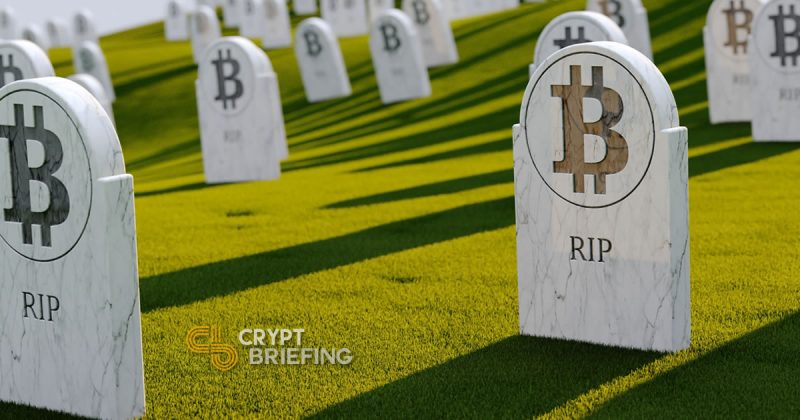
All Dogecoins Go to Heaven: Crypto After You Kick It
Ripple just lost half a billion dollars in market cap, at least until someone finds Matthew Mellon’s key. His unexpected death left hundreds of millions of dollars in blockchain limbo, and his family is scrambling to find a way to access them.
Ripple just lost half a billion dollars in market cap, at least until someone finds Matthew Mellon’s key. The unexpected death left hundreds of millions of dollars in blockchain limbo, and his family is scrambling to find a way to access them.
The banking heir (and early XRP adopter) had been struggling with opiate addiction, and was apparently on his way to a rehab facility. Somewhere along the way he stopped for a trip on Ayahuesca, and a heart attack cut his trip short.
It’s probably not the first crypto-fortune to vanish into thin air. Unless Mr. (or Ms.) Nakomoto is living a very frugal lifestyle, it seems quite likely that the inventor of Bitcoin has already passed on, leaving about a million unclaimable bitcoins—not to mention the corresponding fortunes in Bitcoins Cash, Gold, Private, and so on.
More coins are lost to carelessness than hacks, and as early adopters get older (and wealthier) it’s becoming more important to highlight the best practices for preserving your coins after you die.
With that in mind, here are a few ways to ensure that you don’t keep HODLing through the afterlife.
How to preserve your coins, in case you die tomorrow
The vast majority of crypto-wallets are not well secured, for the simple reason that their balances are too low to worry about. But even pocket-change is worth holding onto, as some early adopters learned the hard way.
The simplest thing to do is to leave your money on an exchange. That sounds like terrible advice to serious players, but Coinbase is a lifesaver for crypto-newbies. It certainly helped the family of one Colorado hodler:—after the young man died unexpectedly, the family brought his death certificate to recover his Coinbase Vault.
A better safeguard might be to share your private keys with your loved ones—depending on how much you trust them. BIP39 words make it easy to store wallet data, even on innocent-looking scraps of paper—just make sure your family knows where to look for them.
One thing to avoid: Flash drives are not particularly resilient, and ledgers have uncertain lifespans. If you want something to last a few decades, pen and paper, or metal, will do the trick.
How to preserve your coins, in case you die next year
These systems are not ideal, for obvious reasons. For one thing, some people aren’t willing to wait that long for their inheritance, and it’s a bit tempting when grandpa keeps the key to his fortune on the back of a receipt. More to the point, things can get lost, go missing or catch fire—and if that happens, you definitely don’t want to be telling an insurance adjuster that you kept a million dollars on a Post-It.
If you have more time to prepare, a safe deposit box is probably your next best bet, unless you have a few hundred bucks to spend on a fireproof safe. It may seem counterintuitive to store “the future of money” in an old-fashioned bank, but that’s a lot less silly than letting a fortune disappear when you die.
The Gemini twins use a similar failsafe. Instead of leaving their wallet in a single bank, the Winklevosses locked their Bitcoin fortune on a paper wallet and ripped up the key. The fragments were distributed across several bank vaults. Reassembling it would take quite a few bank robberies….or the greatest video game quest of all time.
One thing to remember: unlike deposits, bank boxes are not insured. If they get robbed, the money’s gone. There are a few ways to make things more secure—you could leave an encrypted wallet in the bank and tell the password to your lawyer or spouse.
How to preserve your coins, in case you die in a decade.
Most of these ideas are makeshifts—they rely on trusting someone else to follow the rules after you’ve already kicked it. Most of us can’t get far without relying on a lawyer or a bank—but crypto is supposed to get us away from trusting third parties.
But what if there were a way to put your will in code?
Instead of using a regular wallet, imagine storing your money in a smart contract instead—which can be coded with the provisions of your will. You’d have the Master Key, which you can use to spend money whenever you want. But if misfortune befell the owner, the wallet could also be opened with the right combination of private keys. Perhaps all of your children would have to open it together, or half of them plus your lawyer, or all the kids and grandkids combined.
That may sound futuristic, but it’s closer than you’d think. One company, MyWish, is already creating worry-free smart contracts on the NEO blockchain, covering everything from wills to prenuptial agreements. If you don’t like NEO, Bitcoin can handle wallets with up to twenty signatures, and Ethereum can be even more complex.
But then you’d have another problem to worry about: if something happens to your kids, what happens to their private keys?
Disclaimer: The author is invested in Bitcoin, Neo and Ether, which are mentioned in this article.
